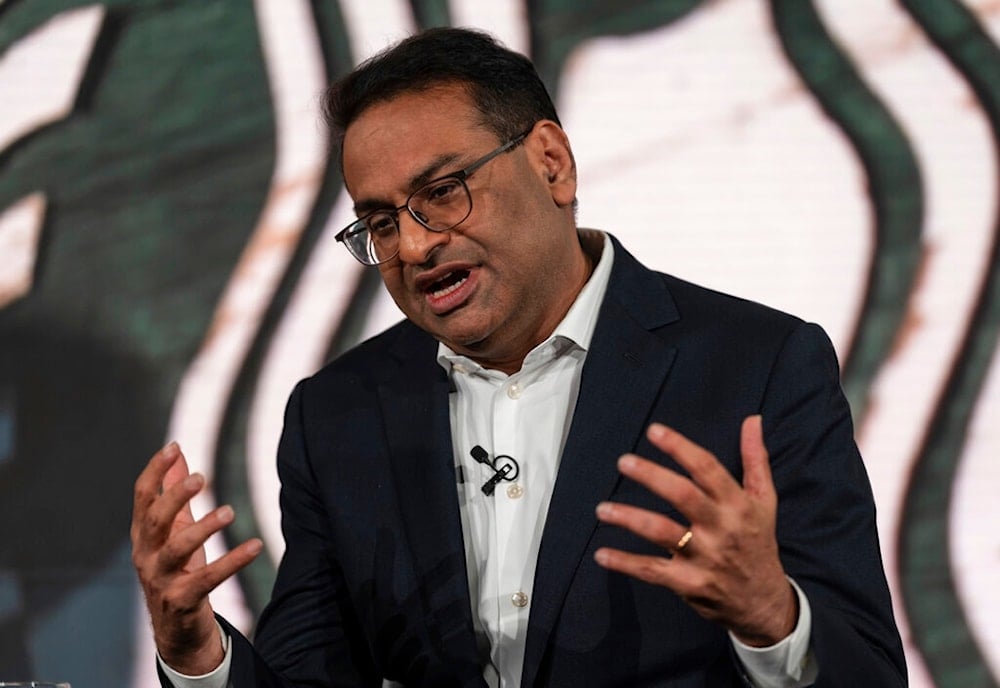Narasimhan steps down as Starbucks CEO after disappointing earnings
Starbucks had previously cited weakening consumer sentiment and challenging market conditions in China as contributing factors to its struggles.
-

Incoming chief executive officer Laxman Narasimhan speaks from the stage during Starbucks Investor Day, Tuesday, September 13, 2022, in Seattle. (AP)
Starbucks announced on Tuesday that Brian Niccol, the current CEO of Chipotle, will succeed Laxman Narasimhan as the company’s new CEO, a little over a year after the latter assumed the role.
Narasimhan stepped down as CEO and as a member of Starbucks’ board “with immediate effect,” the company confirmed in a statement.
The company faced a disappointing earnings report in April, which led to a drop in its share price and prompted Narasimhan to pledge a strategic reset.
Starbucks had previously cited weakening consumer sentiment and challenging market conditions in China as contributing factors to its struggles.
It has also reported a "significant impact on traffic and sales" in the Middle East after calls to boycott the brand began soon after the launch of the ongoing Israeli war on the Gaza Strip.
Narasimhan mentioned during a post-quarterly earnings conference call that the company's performance during the first quarter of the 2024 fiscal year did not meet the projections set by analysts.
He also acknowledged that the boycott has affected the chain beyond the Middle East and in the United States as well. Reports indicate that Starbucks has witnessed a decrease in customer traffic at its US stores starting in mid-November.
Additionally, the company has been dealing with pressure from activist fund Elliott Investment Management, which had taken a stake in the company and sought ways to boost the share price.
"The replacement of Laxman Narasimhan as Starbucks CEO is the result of growing dissatisfaction, particularly from activist investors, over the way the chain has been run," indicated Neil Saunders, managing director at GlobalData, in a statement.
"While some of the slowdown can be attributed to a more sluggish consumer cutting back, much is also the result of a worsening store experience and a lack of innovation in areas like food," he explained.
"Because of this Starbucks has been losing share to smaller, independent coffee shops and other rivals for a while, and the failure of Narasimhan to address this convincingly has irked investors."
Another likely factor in Narasimhan’s departure was dissatisfaction from former Starbucks CEO Howard Schultz, who openly criticized his successor’s leadership in a viral LinkedIn post in May, blaming the chain’s US operations for its "fall from grace."
Schultz stated in a comment to The Wall Street Journal that Niccol has his "respect and full support."
Read more: US food brands in Asia suffer multimillion-dollar pause amid boycott
Record-breaking number of CEO exits
In a related context, Bloomberg reported that the sudden departure of Narasimhan from Starbucks has contributed to a record-breaking number of CEO exits among US companies.
This year, 191 CEOs from the Russell 3000 Index have stepped down, with 74 of those departures classified as dismissals or forced exits, according to data from exechange.com, a research firm that tracks executive changes through public sources.
This represents the highest number of such exits by this time of year since the firm began monitoring CEO transitions in 2017.
"CEOs who do not perform well in the rapidly changing market environment are now apparently being replaced very rigorously," suggested Daniel Schauber, founder of exechange.com, in an interview Tuesday.
Bloomberg noted that Starbucks had reported two consecutive quarters of declining comparable sales, with its shares falling by 20% this year prior to the leadership change.
Moreover, its board had reportedly faced pressure from activist investors Elliott Investment Management and Starboard Value, while former CEO Howard Schultz had publicly and privately expressed concerns about the company’s direction.
Board Chair Mellody Hobson mentioned in an interview with CNBC on Tuesday that Narasimhan’s departure was not necessarily due to external pressures.
Exechange.com assigns a score to CEO departures on a scale of 1 to 10, with 1 indicating a voluntary departure and 10 indicating a clear dismissal. The average CEO departure score in 2024 is 6.2, the highest since the firm began tracking this data.
Narasimhan’s departure received a score of 9.
Read more: Boycotting works: Starbucks loses $11Bn in market value

 4 Min Read
4 Min Read








